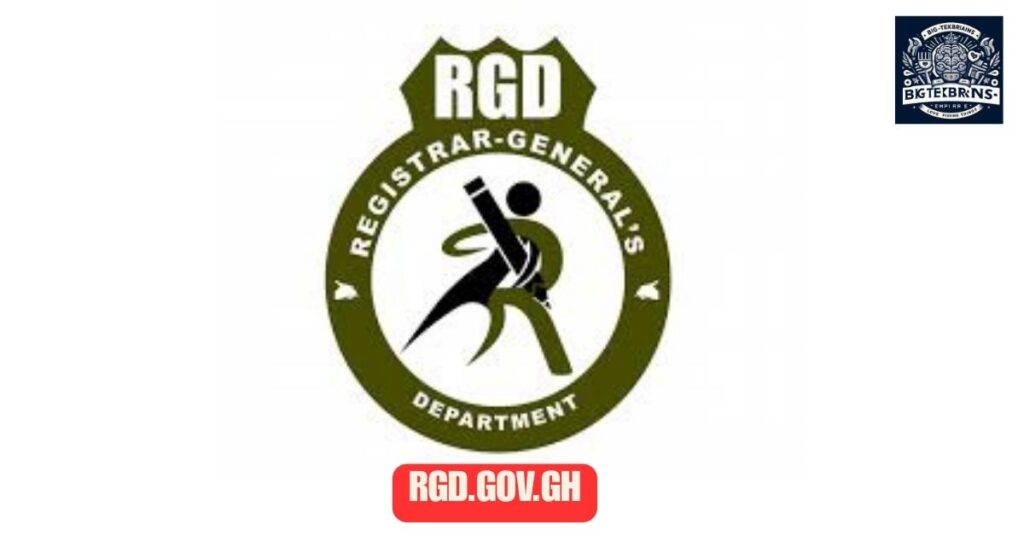Introduction
The Registrar General’s Department (RGD) in Ghana is a critical institution in the country’s administrative framework. Here’s an in-depth overview covering its history, operations, offices, ranks, establishment, constitutional roles, and reforms.
Establishment
The Registrar General’s Department was established in 1950 under the Ordinance 1950 (Cap 193) to register businesses, companies, and other legal entities in Ghana. Its functions have since expanded to cover a range of activities, including intellectual property rights and marriage registration.
Chronological Historical Overseers
Colonial Era (1950–1957):
- Initially overseen by colonial administrators, the department’s primary role was to regulate and maintain a record of businesses and trademarks.
Post-Independence (1957–1975):
- With independence, oversight was transitioned to Ghanaian administrators. The department focused on creating a structured environment for businesses to flourish.
Modern Era (1975–Present):
- Modernization efforts have included digital reforms and integration into Ghana’s judicial and administrative framework to ensure efficient service delivery.
Offices Under and Working With RGD
The RGD collaborates with several agencies to fulfill its mandate. Key offices include:
Company Registry:
- Responsible for the incorporation of companies and business names.
Intellectual Property (IP) Office:
- Oversees trademarks, patents, and copyrights.
Marriage Registry:
- Manages statutory and customary marriage registrations.
Estate Administration Office:
- Handles intestate estate matters.
Collaboration with Other Institutions:
- Works closely with the Ghana Revenue Authority (GRA), Judicial Service, and the Ministry of Justice for tax compliance, dispute resolution, and policy enforcement.
Ranks and Duties
The department’s hierarchical structure ensures smooth operation:
Registrar-General:
- The head of the department, responsible for strategic leadership and oversight.
Deputy Registrars:
- Manage specific divisions like Companies Registry, Marriage Registry, and IP office.
Assistant Registrars:
- Handle operational tasks such as record management, client service, and enforcement.
Clerical Staff:
- Provide administrative support, process applications, and manage customer interactions.
Constitutional Roles
The RGD operates under several constitutional and statutory provisions:
Business and Corporate Regulation:
- The Companies Act, 2019 (Act 992) mandates the RGD to register and regulate all forms of companies.
Marriages:
- The Marriage Act, 1884-1985 (Cap 127) empowers the department to oversee statutory marriages.
Estate Administration:
- The Administration of Estates Act, 1961 (Act 63) gives the department authority over estate matters.
Reforms
The RGD has undergone significant reforms to improve efficiency:
Digitalization:
- Introduction of an online portal to enable electronic business registration, filing of annual returns, and other services.
Public-Private Partnerships:
- Collaboration with private tech firms to modernize operations.
Decentralization:
- Opening regional offices to enhance accessibility.
Legal Reforms:
- Passage of new laws like the Companies Act, 2019 to reflect international best practices.
FAQ Section
1. What is the Registrar General’s Department in Ghana responsible for?
The Registrar General’s Department (RGD) is responsible for registering companies, businesses, trademarks, marriages, and estates, ensuring compliance with Ghana’s corporate and legal frameworks.
2. When was the Registrar General’s Department established in Ghana?
The RGD was established in 1950 under the Ordinance 1950 (Cap 193) to regulate businesses and legal entities.
3. What are the key reforms implemented by the RGD?
The RGD has undergone significant reforms, including digitalization of services, decentralization through regional offices, and legal updates such as the Companies Act, 2019.
4. What are the constitutional roles of the Registrar General’s Department?
The RGD is empowered under laws like the Companies Act, 2019 and the Marriage Act, 1884-1985 to regulate businesses, register marriages, and manage estate administration.
5. How does the Registrar General’s Department collaborate with other agencies?
The RGD works with institutions like the Ghana Revenue Authority (GRA) and the Ministry of Justice for tax compliance, legal enforcement, and policy implementation.
6. What is the hierarchy of duties in the RGD?
he department is headed by the Registrar-General, supported by Deputy Registrars, Assistant Registrars, and clerical staff managing specific divisions such as Company Registry and Intellectual Property.
7. Can I register a business online with the Registrar General’s Department in Ghana?
Yes, the RGD offers an online portal for electronic business registration, filing of annual returns, and other services.
8. What services does the Intellectual Property (IP) Office under the RGD provide?
The IP Office handles the registration and protection of trademarks, patents, and copyrights in Ghana.
9. Where can I find the Registrar General’s Department in Ghana?
The RGD has a head office in Accra and regional offices across the country for easier accessibility.
10. What documents are required for marriage registration at the RGD?
Marriage registration typically requires identification documents, completed forms, and payment of the required fees. Specific requirements may vary based on the type of marriage (statutory or customary).
References
Registrar General’s Department Official Website:
- Provides detailed information about the department’s operations and reforms.
Ghana Companies Act, 2019 (Act 992):
- Governs the registration and regulation of companies in Ghana.
Ghana Judicial Service and Ministry of Justice Reports:
- Document collaborations and the constitutional framework within which the RGD operates.

